Fertiliser To Pest Management: 9 Ways To Use Eggshells In The Garden


Elizabeth is a Permaculture Garden Designer, Sustainability Consultant and Professional Writer, working as an advocate for positive change. She graduated from the University of St. Andrews with an MA in English and Philosophy and obtained a Diploma in Applied Permaculture Design from the Permaculture Association.
Reviewed By COLIN SKELLY

Colin is a Horticulturist and Horticultural Consultant with experience in a range of practical and managerial roles across heritage, commercial and public horticulture. He holds the Royal Horticultural Society’s Master of Horticulture award and has a particular interest in horticultural ecology and naturalistic planting for habitat and climate resilience.
Learning how to use eggshells in the garden and compost can help you reduce waste and create a healthier and more productive space.
Eggshells are something that many people don’t think twice about tossing away, but sending food waste to landfill or for incineration is never a good idea.1Fight climate change by preventing food waste. (n.d.). World Wildlife Fund. Retrieved March 15, 2023, from https://www.worldwildlife.org/stories/fight-climate-change-by-preventing-food-waste

To reduce your carbon footprint and live in a more sustainable way, you should reduce food waste as much as possible.
If you do not already compost at home, you should get started right away and you should definitely add eggshells to that system.

In this article, we will focus on how to use eggshells in the garden and why, if you don’t want to use them in other ways, composting them is also an excellent idea.
Here are several ways you can use eggshells in your garden:
1) As Seed Starting Pots

The first way to use eggshells is as little seed starting pots.
You might remember from your childhood putting damp cotton wool or kitchen paper in eggshells, sowing cress seeds on top, drawing little faces on the sides and waiting for the ‘hair’ to grow.
Eggshells can also be filled with a seed starting potting mix and used for starting out a range of seeds which can then be potted on or planted out into your garden.
Using eggshells in this way is one option which can help you reduce plastic use in your growing efforts.

Eggshells are good for starting micro-greens on a windowsill or for sowing a range of crops for the very first stage of their life.
Some people use eggshells as biodegradable plant pots, planting them into the ground along with the seedling.
However, eggshells do take a while to break down, so it is important to make sure you gently crack the shells apart before planting so the roots of the growing plants can spread out, or to simply remove the seedlings from the eggshells and then reuse them.
2) As An Organic Fertiliser
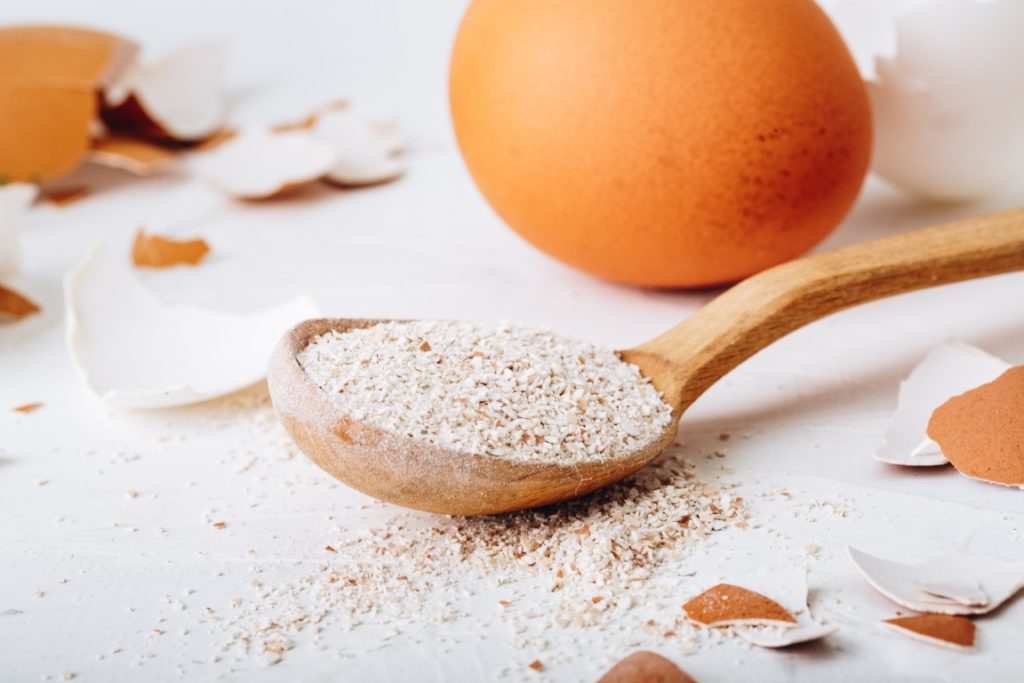
Eggshells are often thought of as a waste product, but when we actually begin to look at their composition, it can be easier to see their value for a garden.
Eggshells are made up of around 95% calcium carbonate, 0.3% phosphorus, 0.3% magnesium and trace amounts of other plant nutrients such as potassium, sodium, zinc, manganese, copper and iron.2Concepts of Eggshell Quality. (n.d.). University of Florida. Retrieved March 15, 2023, from https://edis.ifas.ufl.edu/publication/VM013
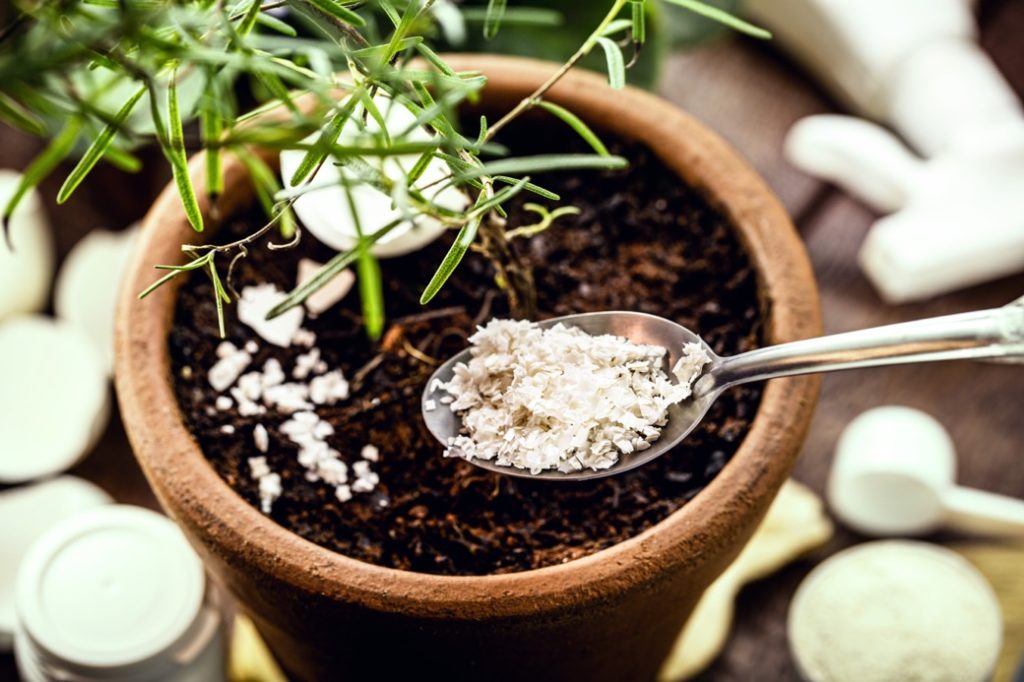
Ground eggshell meal is an organic fertiliser sometimes used by home growers and commercial organic farmers.
While its NPK value, like other organic fertilisers, will vary, an average analysis revealed an NPK of 1.2 – 0.4 – 0.1. (NPK refers to the values of the three key plant nutrients: nitrogen, phosphorus and potassium).3Organic Calcium Sources. (n.d.). Grow It Organically. Retrieved March 15, 2023, from https://www.grow-it-organically.com/organic-calcium-sources.html
However, eggshells are known particularly for adding calcium to the soil.
3) To Reduce Soil Acidity
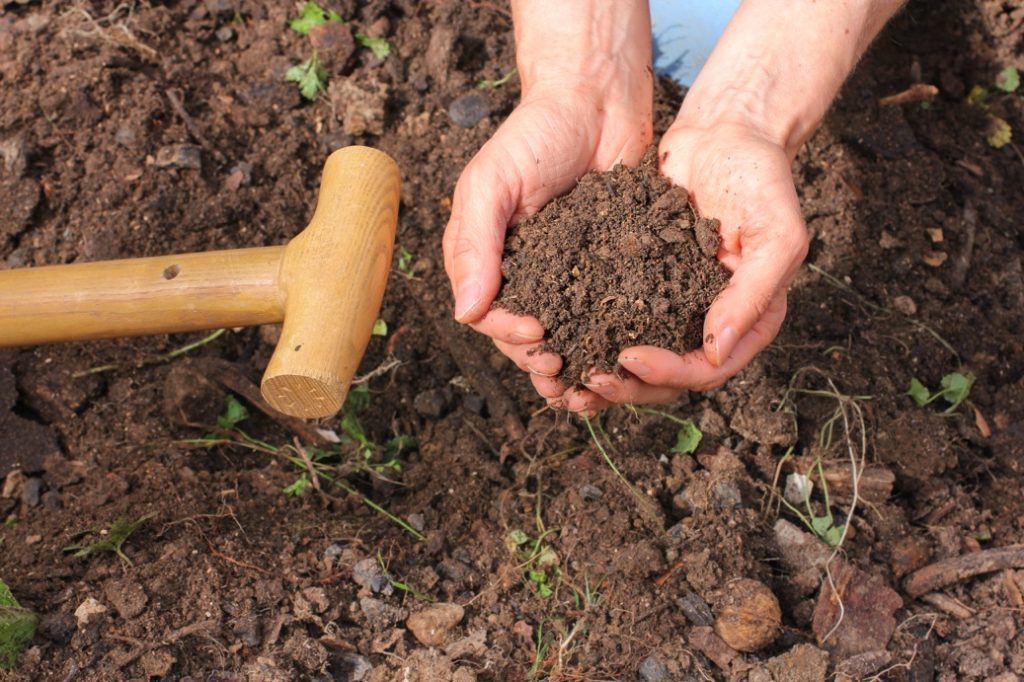
Gardeners and growers battling with very acidic soil will often use lime (mined from limestone – an extractive and finite product) to reduce soil acidity.
However, studies have shown that ground eggshells are on par with agricultural lime and can be a more eco-friendly and sustainable way to achieve the same result.4Saldanha, R. B., Da Rocha, C. G., Caicedo, A., & Consoli, N. C. (2021). Technical and environmental performance of eggshell lime for soil stabilization. Construction and Building Materials, 298, 123648. https://doi.org/10.1016/j.conbuildmat.2021.123648
Of course, gardeners will have to determine the pH of their soil in order to decide whether adding a lot of ground eggshells is a good idea in their situation.

Remember, acidic soil is desirable for growing some plants (blueberries and other ericaceous plants), so adding excessive amounts of an alkaline supplement like this one won’t be a good idea if you want to grow plants of this type.
Adding eggshells excessively might also be a bad idea if you already have particularly chalky, alkaline soil.
4) When Planting Out Crops

While adding supplements like ground eggshells is not always the best idea in all situations, it can often be beneficial to add powdered eggshells to the hole when planting out certain crops.
Plants which will benefit from this in particular are those which have high calcium requirements or those which will tend to develop issues if calcium is not sufficient.
Larger pieces of eggshell will break down too slowly to do much, but grinding the eggshells and using the powder will make the calcium they contain more readily available for your plants.
5) To Give A Calcium Boost
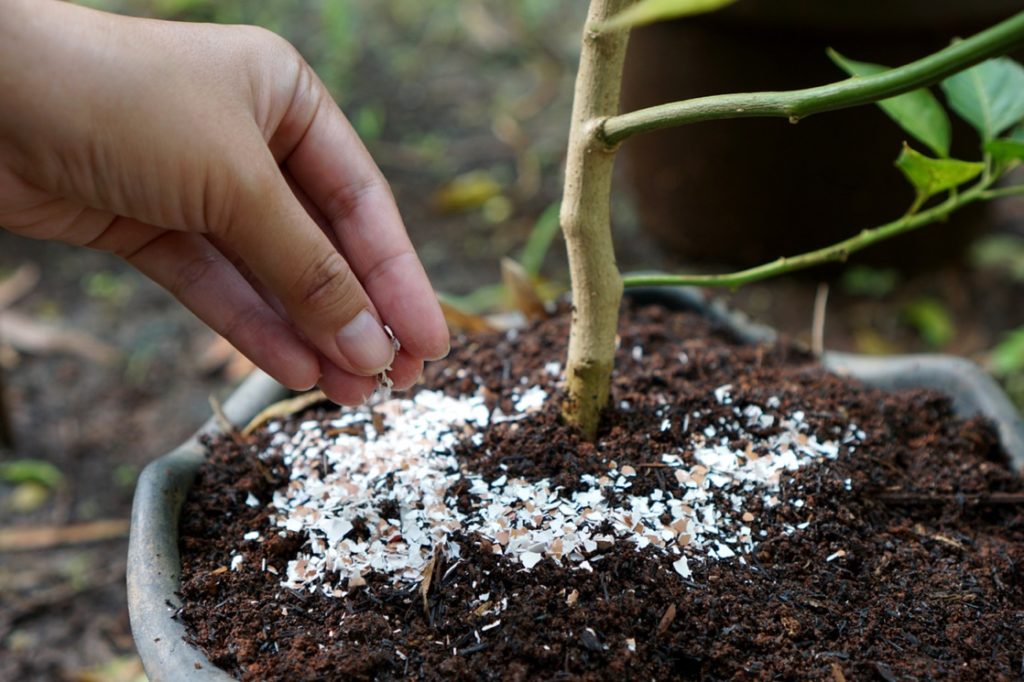
Tomatoes are one plant which can benefit from a sprinkling of crushed eggshells around them to provide calcium, as a calcium deficiency can cause blossom end rot.5Blossom end rot. (n.d.). Royal Horticultural Society. Retrieved March 15, 2023, from https://www.rhs.org.uk/problems/blossom-end-rot
As well as placing powdered eggshells in the planting hole, it can also be beneficial to sprinkle finely crushed eggshells around the plants as part of an organic mulch.
All plants need calcium for cell wall development, enzyme activity, nitrate uptake and metabolic processes.
Some plants will particularly benefit from a boost of available calcium in the soil including, not just tomatoes, but also peppers, potatoes and other Solanaceae, brassicas, cucurbits, lettuce, and fruit trees like apples, cherries and pears.
6) To Deter Pests

Some swear by crushed eggshells to keep slugs and snails away from seedlings and tender young plants.
Unfortunately, this anecdote is not borne out by science, and experimentation has shown that slugs are rarely deterred by eggshells and will often pass a barrier of crushed eggshells with no difficulty at all.6Barkham, P. (2021, October 29). Eggshell and copper tape do not protect veg from slugs and snails. The Guardian. Retrieved March 15, 2023, from https://www.theguardian.com/environment/2018/sep/27/eggshell-and-copper-tape-do-not-protect-veg-from-slugs-and-snails
“A recent experiment by the RHS replicating a garden situation revealed that lettuces protected with physical barriers, including, eggshell fragments, suffered the same amount of damage as those lettuces without protection,” adds Colin Skelly.7Plant pests: research projects by the RHS Entomology scientists. (n.d.). Royal Horticultural Society. Retrieved March 28, 2023, from https://www.rhs.org.uk/science/plant-health-in-gardens/entomology/rhs-projects-on-plant-pests/gastropod-barriers-experiment
However, there is some suggestion that eggshells crushed and laid thickly around the base of plants may at least partially deter soft-bodied pests like cutworms in a garden.

Eggshells alone are unlikely to be an answer to a pest problem.
When it comes to pest management, it is best to look holistically at the problem and boost biodiversity to attract plenty of predatory creatures to keep pest numbers down.
7) As A Supplement To Chicken Feed

If you keep chickens in your garden, you may already know that it is not a good idea to feed whole eggshells as this can encourage egg eating in the coop.
However, crushed shells can and should be given as a supplement.
8) As A Feed For Wild Garden Birds

You may also add finely crushed eggshells to a bird feeder to keep the wild bird population in your garden healthy.8Do your bit for birds. (2008, April 29). BBC Norfolk. Retrieved March 15, 2023, from https://www.bbc.co.uk/norfolk/content/articles/2008/04/17/dawn_chorus_do_your_bit_feature.shtml
9) To Add To Your Composting System
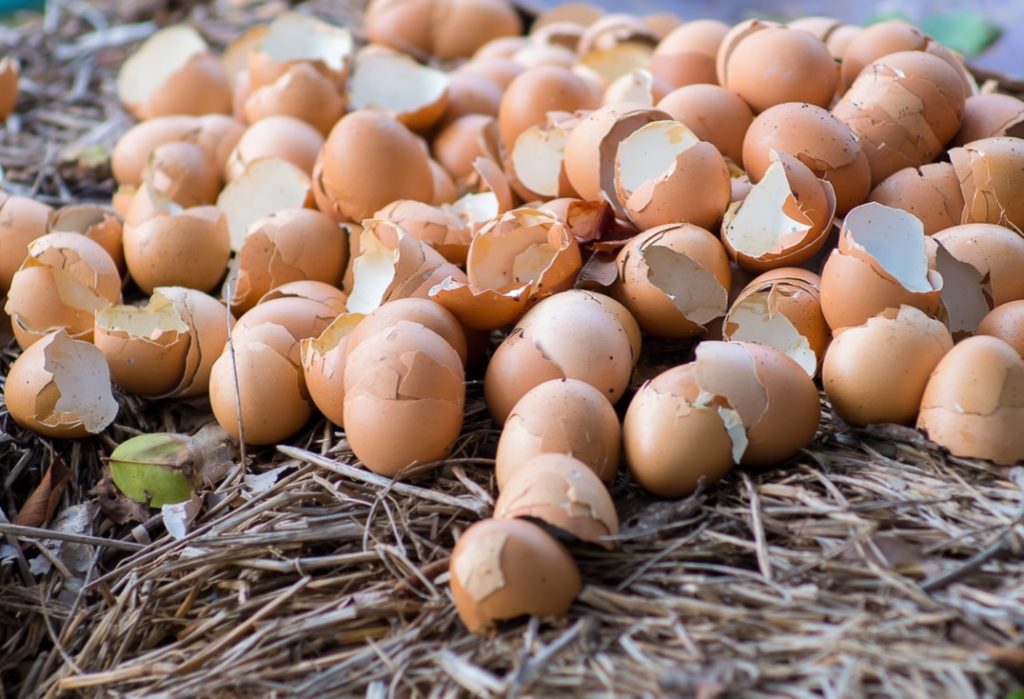
Even if you don’t have other uses for them, eggshells can be a good addition to your composting system.
Of course, the eggshells will add calcium and other micro-nutrients to the compost, helping to make sure it has a good nutrient profile.
Beyond this, eggshells can also be beneficial for earthworms (whether in the soil or the special worms in a vermicomposting system).
Grinding up eggshells is best, unless you are bokashi fermenting first, in which case the shells will break down just fine.

First of all, ground-up eggshells won’t leave larger, slower-to-break-down pieces in the compost that you retrieve from the system.
Secondly, smaller pieces of ground-up eggshell are best for worms, which need grit to digest their food.
The ground-up eggshells work very well for this purpose.
Crush or grind your eggshells to avoid any issues and get the most benefits from the eggshells in your composting system.
References
- 1Fight climate change by preventing food waste. (n.d.). World Wildlife Fund. Retrieved March 15, 2023, from https://www.worldwildlife.org/stories/fight-climate-change-by-preventing-food-waste
- 2Concepts of Eggshell Quality. (n.d.). University of Florida. Retrieved March 15, 2023, from https://edis.ifas.ufl.edu/publication/VM013
- 3Organic Calcium Sources. (n.d.). Grow It Organically. Retrieved March 15, 2023, from https://www.grow-it-organically.com/organic-calcium-sources.html
- 4Saldanha, R. B., Da Rocha, C. G., Caicedo, A., & Consoli, N. C. (2021). Technical and environmental performance of eggshell lime for soil stabilization. Construction and Building Materials, 298, 123648. https://doi.org/10.1016/j.conbuildmat.2021.123648
- 5Blossom end rot. (n.d.). Royal Horticultural Society. Retrieved March 15, 2023, from https://www.rhs.org.uk/problems/blossom-end-rot
- 6Barkham, P. (2021, October 29). Eggshell and copper tape do not protect veg from slugs and snails. The Guardian. Retrieved March 15, 2023, from https://www.theguardian.com/environment/2018/sep/27/eggshell-and-copper-tape-do-not-protect-veg-from-slugs-and-snails
- 7Plant pests: research projects by the RHS Entomology scientists. (n.d.). Royal Horticultural Society. Retrieved March 28, 2023, from https://www.rhs.org.uk/science/plant-health-in-gardens/entomology/rhs-projects-on-plant-pests/gastropod-barriers-experiment
- 8Do your bit for birds. (2008, April 29). BBC Norfolk. Retrieved March 15, 2023, from https://www.bbc.co.uk/norfolk/content/articles/2008/04/17/dawn_chorus_do_your_bit_feature.shtml
